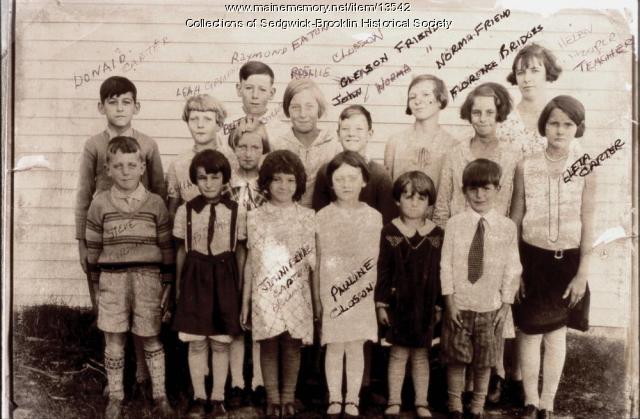Keywords: Rear Window
- Historical Items (11)
- Tax Records (0)
- Architecture & Landscape (0)
- Online Exhibits (11)
- Site Pages (4)
- My Maine Stories (2)
- Lesson Plans (0)
Online Exhibits
Your results include these online exhibits. You also can view all of the site's exhibits, view a timeline of selected events in Maine History, and learn how to create your own exhibit. See featured exhibits or create your own exhibit
Exhibit
The West Baldwin Methodist Church, founded in 1826, was one of three original churches in Baldwin. While its location has remained the same, the church has undergone numerous changes to serve the changing community.
Exhibit
Home: The Wadsworth-Longfellow House and Portland - Streetscape, 1790-1930
"… stands far back from the street at the right rear of the house. All but the three bays of the east portion of the Preble House were demolished in…"
Exhibit
Reading, Writing and 'Rithmetic: Brooklin Schools
When Brooklin, located on the Blue Hill Peninsula, was incorporated in 1849, there were ten school districts and nine one-room school houses. As the years went by, population changes affected the location and number of schools in the area. State requirements began to determine ways that student's education would be handled. Regardless, education of the Brooklin students always remained a high priority for the town.
Exhibit
A Portland newspaper wrote about an ice storm of January 28, 1886 saying, "The city of Portland was visited yesterday by the most inconvenient storm of the season."
Exhibit
For the Union: Civil War Deaths
More than 9,000 Maine soldiers and sailors died during the Civil War while serving with Union forces. This exhibit tells the stories of a few of those men.
Exhibit
From Sewers to Skylines: William S. Edwards's 1887 Photo Album
William S. Edwards (1830-1918) was a civil engineer who worked for the City of Portland from 1876-1906. Serving as First Assistant to Chief Engineer William A. Goodwin, then to Commissioner George N. Fernald, Edwards was a fixture in City Hall for 30 consecutive years, proving indispensable throughout the terms of 15 Mayors of Portland, including all six of those held by James Phineas Baxter. Edwards made significant contributions to Portland, was an outstanding mapmaker and planner, and his works continue to benefit historians.
Exhibit
2009 marked the bicentennials of the births of Abraham Lincoln and his first vice president, Hannibal Hamlin of Maine. To observe the anniversary, Paris Hill, where Hamlin was born and raised, honored the native statesman and recalled both his early life in the community and the mark he made on Maine and the nation.
Exhibit
Maine Eats: the food revolution starts here
From Maine's iconic lobsters, blueberries, potatoes, apples, and maple syrup, to local favorites like poutine, baked beans, red hot dogs, Italian sandwiches, and Whoopie Pies, Maine's identity and economy are inextricably linked to food. Sourcing food, preparing food, and eating food are all part of the heartbeat of Maine's culture and economy. Now, a food revolution is taking us back to our roots in Maine: to the traditional sources, preparation, and pleasures of eating food that have sustained Mainers for millennia.
Exhibit
Dressing Up, Standing Out, Fitting In
Adorning oneself to look one's "best" has varied over time, gender, economic class, and by event. Adornments suggest one's sense of identity and one's intent to stand out or fit in.
Exhibit
Wired! How Electricity Came to Maine
As early as 1633, entrepreneurs along the Piscataqua River in southern Maine utilized the force of the river to power a sawmill, recognizing the potential of the area's natural power sources, but it was not until the 1890s that technology made widespread electricity a reality -- and even then, consumers had to be urged to use it.
Exhibit
Summer Folk: The Postcard View
Vacationers, "rusticators," or tourists began flooding into Maine in the last quarter of the 19th century. Many arrived by train or steamer. Eventually, automobiles expanded and changed the tourist trade, and some vacationers bought their own "cottages."











